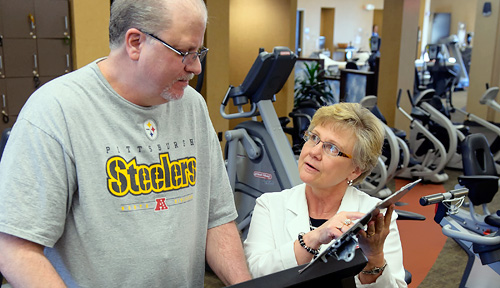Phil Hester didn’t mind shoveling snow, but noticed that he tired easily. He didn’t understand why as he never smoked and was active in sports.
At 47, he thought it was age, but a broken rib sent him to the doctor, who was alarmed that Hester’s heart rate couldn’t be detected.
An immediate stress test revealed his heart was pumping a mere 12 percent.
“During the test, the nurses watched the monitor and asked how I could even stand up. I wasn’t sure what it all meant,” he said.
Hester was whisked to the emergency room and a three-day hospitalization. His diagnosis: congestive heart failure.
On disability, Hester became involved in a small, preliminary study through the UNMC College of Nursing Lincoln Division to test adherence to exercise in heart failure patients.
The pilot study led to a $3.36 million, five-year grant from the National Institutes of Health – National Heart Lung and Blood Institute to analyze long-term adherence to exercise in heart failure patients at Bryan Heart in Lincoln and at Wayne State University and Henry Ford Health System in Detroit.
In heart failure, the heart is weakened over time and can’t pump enough blood to meet the body’s needs. Though the disease is chronic, progressive and incurable, medications and lifestyle change can help people live longer with more active lives. Regular exercise helps patients tolerate more activity, reduce fatigue and improve their mood.
Two groups of randomized patients in the study will receive access to a gym and exercise training. One group will receive additional educational group sessions and support for adherence from an exercise coach.
“Twenty years ago we would have said you shouldn’t exercise, but now we know that exercise is safe and beneficial,” said Bunny Pozehl, Ph.D., professor of nursing in the UNMC College of Nursing-Lincoln Division and principal investigator of the study. “The biggest problem is getting patients to follow an exercise plan. No studies before have focused on this problem.
“Our patients get short of breath, tire more easily and are afraid to initiate exercise. They fear that it will stress their failing heart too much. What they don’t know is exercise is beneficial and will actually help them feel better and have more energy.”
Dr. Pozehl, a nurse practitioner who has worked with the heart failure clinic at Bryan Heart for 17 years, said some of the common barriers to exercise for heart failure patients are the cost of exercise programs and fears that exercise may cause complications. Currently, supervised exercise programs for heart failure patients aren’t reimbursed by most insurance companies and Medicare.
Hester credits exercise and medication for getting his heart strengthened to near normal capacity. “It helped me out a lot and made me feel better. I lost some weight and could breathe easier.”
